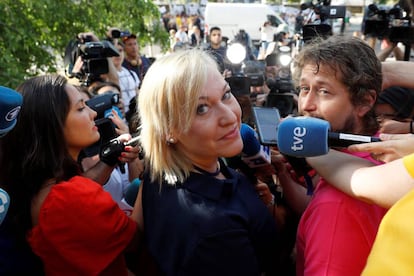Time for justice
The first case to go to trial in connection with a network of stolen babies is a reminder of a pending task in Spain

Before turning the page on history, it is necessary to read that page first. And Spain has yet to read the chapter on the shameful and widespread practice of taking babies away from mothers who were typically single, with no resources or the ability to protest, and then giving those children to wedded couples whom the Franco regime considered appropriate parents.
Starting with the Civil War (1936-1939), and up until 1981, many women were systematically robbed of their newborns during the Franco dictatorship and early democratic years – first inside the prisons and later at health clinics. The baby theft was perpetrated by medical and religious elites who denied these women their ability to be mothers, and who allegedly profited financially from the transaction.
Addressing the wounds of the past in order to overcome them is a sign of democratic maturity
The babies were delivered to couples who were in good standing with the Franco regime, generally prior payment of amounts that fueled the baby trafficking – which was viewed as adoptions back at the time. Prosecutors have received nearly 2,000 complaints so far.
The story has slowly emerged in recent years thanks to media reporting and to the work of some judges and victim support groups. But a milestone was reached this week with the first case to go to trial. Doctor Eduardo Vela, former director of the San Ramón clinic in Madrid, one of the epicenters of the baby trafficking network, stood trial at the Madrid regional High Court on Tuesday for illegal detention, and for falsifying childbirth records and other official documents. In 1969, Vela allegedly handed over a stolen baby to a woman named Inés Pérez, who has since passed away. The prosecution is seeking an 11-year prison term for the obstetrician.
The trial builds on a personal struggle by Inés Madrigal with help from her adoptive mother, Inés Pérez, who set out to find the truth and shed light on one of the darkest chapters in recent Spanish history. Before dying, Inés Pérez stated that Dr Vela gave her instructions to fake a pregnancy, such as pretending to have nausea, refraining from wearing makeup or going to the hairdresser, and stuffing her clothes with cushions to simulate a belly. He then gave her a baby who grew up to start criminal proceedings against him. Dr Vela, who is now 85 years old, had alleged health problems to avoid his appearance before a judge, but a court-appointed medical examiner declared him fit to stand trial.
Spain still has significant unresolved issues to deal with in connection with the still-recent dictatorship
Spain still has significant unresolved issues to deal with in connection with the still-recent dictatorship, such as transferring Francisco Franco’s remains from the Valley of the Fallen and assigning new meaning to this landmark site, or recovering the bodies of people who were executed and dumped in mass graves, often by a roadside.
Baby theft and trafficking is one of the most egregious of these issues, and also one of the hardest to resolve, since the people involved have either died or are very old. Yet our institutions must accept the challenge of shedding light on those events, to satisfy the victims’ demands to meet their biological parents, and to bring justice to the victims of crimes that have, in principle, no statute of limitations. Addressing the wounds of the past in order to overcome them is, after all, a sign of democratic maturity that Spain can and must require of itself.
English version by Susana Urra.
Tu suscripción se está usando en otro dispositivo
¿Quieres añadir otro usuario a tu suscripción?
Si continúas leyendo en este dispositivo, no se podrá leer en el otro.
FlechaTu suscripción se está usando en otro dispositivo y solo puedes acceder a EL PAÍS desde un dispositivo a la vez.
Si quieres compartir tu cuenta, cambia tu suscripción a la modalidad Premium, así podrás añadir otro usuario. Cada uno accederá con su propia cuenta de email, lo que os permitirá personalizar vuestra experiencia en EL PAÍS.
En el caso de no saber quién está usando tu cuenta, te recomendamos cambiar tu contraseña aquí.
Si decides continuar compartiendo tu cuenta, este mensaje se mostrará en tu dispositivo y en el de la otra persona que está usando tu cuenta de forma indefinida, afectando a tu experiencia de lectura. Puedes consultar aquí los términos y condiciones de la suscripción digital.









































